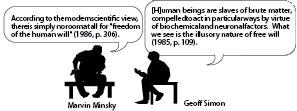Free will is an illusion of experience
We may think that we are free, but that is just an illusion of experience. Actually, we are determined to do what we do by our underlying neural machinery.
5

The Minsky and Simons arguments
"Many notions in our informal explanations do not tolerate close examination. Free will or volition is one such notion . . . A man's or a machine's strength of conviction about such things tells us nothing" (M. Minsky, 1968, p. 431).
"According to the modern scientific view, there is simply no room at all for 'freedom of the human will'" (M. Minsky, 1986, p. 306).
"And then computer science introduced such ideas as plans, schedules and programs--and work began on framing a computer model of the human mind. It became reasonable to believe that programs--implemented by neuronal connections and chemical secretions from ductless glands--would come to define the character of the human choice mechanism. Today it is difficult to see how such a mechanism can be expected to support the free-will metaphysics of a largely pre-scientific age" (G. Simons, 1985, p. 100).
"What we see is the illusory nature of free will. It is a doctrine nourished in pre-scientific cultures to satisfy the psychological urge for recrimination and revenge. It is the staple diet of hellfire fundamentalists, frustrated celibates, and deprived folk who feel legitimate wrath against their exploiters. We cannot assume a particular moral disposition in the free will advocates; but the free will doctrine is so weak in argument that we must look to psychological factors in its upholders, rather than to philosophical justification of the doctrine" (G. Simons, 1985, p. 109).
Note: Quotes from Minsky and as cited in J. Copeland, 1993, p. 144.
References
Minsky, Marvin (ed). 1968. Semantic Information Processing. Cambridge, Mass: MIT Press.
Minsky, Marvin. 1986. The Society of Mind. New York: Simon and Schuster.
Simons, Geoff. 1985. The Biology of Computer Life: Survival, Emotion and Free Will. Boston: Birkhauser.